
Democracy without Engagement: Understanding Political Participation in Post-Communist Romania
(Hardback)
Publishing Details
Democracy without Engagement: Understanding Political Participation in Post-Communist Romania
By (Author) Marius I. Tatar
Bloomsbury Publishing PLC
Lexington Books
16th February 2022
United States
Classifications
Professional and Scholarly
Non Fiction
International relations
323.04209498
Physical Properties
Hardback
254
Width 160mm, Height 238mm, Spine 22mm
581g
Description
How do post-communist citizens engage in the new democracies of Eastern Europe after decades of repressive control exerted by the communist regimes Are peoples involvement in post-communist politics influenced by generic socioeconomic and attitudinal traits, or is it primarily driven by selective mobilization opportunities provided by social networks and organizations This book presents a broad framework for conceptualizing and measuring citizen participation and applies it to Romania as a typical post-communist democracy illustrating the low rates of political activism in the region. Separate chapters examine post-communist citizens participation in elections, attempts to influence authorities beyond voting, cognitive engagement in politics, and direct involvement in local decision-making. Using large-N statistical analyses, the author argues that individuals socioeconomic and attitudinal characteristics have relatively weak influences on citizen participation in the post-communist context. Instead, various organizations and social networks act as politically recruiting and mobilizing agents, driving citizen participation into political actions that can challenge or strengthen democracy. In the absence of a well-developed participatory political culture that would enable citizens to act autonomously in the political sphere, the persistence of post-communist democracies largely depends on the goals and methods pursued by these mobilizing agents.
Reviews
This is an insightful analysis of participation trends in Romania. The author marshals a large amount of empirical evidence and offers thought-provoking interpretation.
-- Filip Kostelka, University of EssexAuthor Bio
Marius I. Ttar is lecturer in Politics at the University of Oradea and research associate at the Research Center for Political Action (CRAPUL), University of Lausanne
